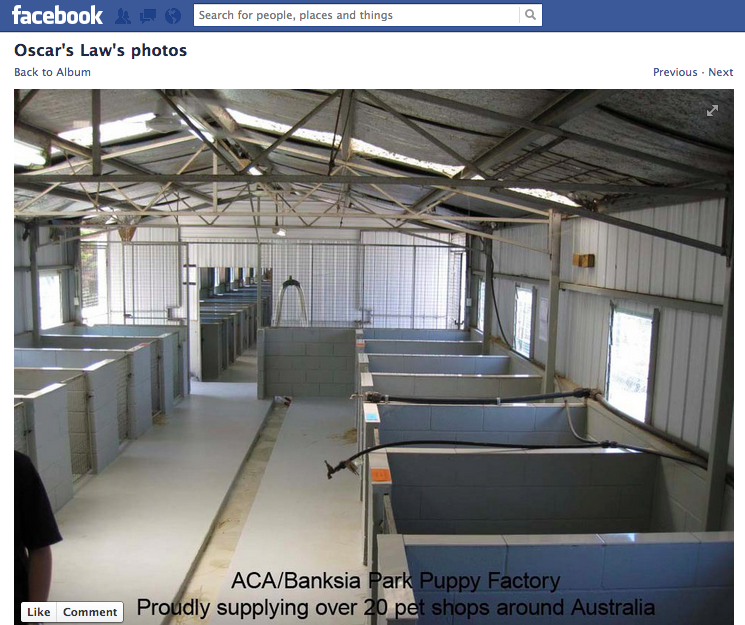Public Misconceptions
I was struck while reading the Companion Animal Taskforce report and that of the Select Committee on Companion Animal Welfare in SA (click ‘Final Report’) on the feedback that was provided by the public. Submissions to both of these committees were making the same uninformed recommendations, and the similarities between public opinions expressed are extensive.
I thought it was time to address some of these misconceptions held by the general public concerning animal welfare.
ACTIVIST AVOWAL: Desexing everything!
The public seems to believe that there is an overpopulation of animals, and that desexed animals are healthier, and therefore argue for mandatory desexing.
In reality, there is no ‘overpopulation problem‘ and it is debatable whether desexing is in the best interest of animal health.
ACTIVIST AVOWAL: Ban pet sales in pet shops!
Most puppies in pet shops come from puppy mills. I like puppy mills as little as the next person, and in no way want to support the practices of puppy farmers.
However, the problem here is puppy mills. Not pet shops.
Pet shops are on public display, and have a pretty strict codes of conduct which are often better/higher than your average backyard breeder. Are they really who we should be targeting?
Furthermore, many pet shops routinely work with rescues to sell/market animals. Do we really want to ban that?
ACTIVIST AVOWAL: Get breeders registered!
There seems to be a logic that if breeders had to be registered there would be less unscrupulous breeding.
As most of these schemes require breeders to pay in order to be registered, what breeder registration effectively does is limit (legal) breeding to those who are making money from the practice. What I mean is: breeders who don’t make money are are probably the ‘ethical ones’, and are probably less likely to be able to afford registration. Are these the individuals we want to perturb from breeding?
Meanwhile, individuals making profits from dog breeding (i.e. the puppy farms) easily purchase their registrations. Some argue that registering breeders would mean that there would be ‘policing’ of legislation surrounding their care. It is already illegal to be cruel to and not ensure the welfare of dogs. If this legislation isn’t being policed, then that’s the matter for the police. Furthermore, is it truly likely that the bad guys are going to sign up to such legislation? “Well, my animals have lived in faeces for years, but now that I have to be registered, I really want to undergo the scrutiny of a policing body.” Yeah, nah.

This is Dulcie’s litter – a bitch that was rescued from a pound when she was 8 weeks pregnant. As a rescue, we whelped and raised this litter. If breeders had to be registered, would rescues have to be registered as breeders, too?
ACTIVIST AVOWAL: Mandatory cooling off periods are cool.
There seems to be a belief that animals are surrendered to rescue because owners ‘didn’t think about their purchase’, or otherwise acquired their pet impulsively. In reality, relinquishment statistics don’t support this, and there is evidence that impulsive adoptions are as successful as planned ones. In this way, there is not evidence that supports mandatory cooling off periods as desirable.
However, there are obvious implications for other animal-selling institutions regarding a mandatory cooling off period. Do we really want to see animals held in pounds even longer? Do we really want to see puppies held in pet shops longer? We know both of these scenarios have negative welfare implications on dogs, so why would we mandate compulsory confinement under the guise of a cooling off period with unsubstantiated positive benefits?
Mandatory cooling off periods restrict adoptions! Bad!
ACTIVIST AVOWAL: Puppy mills should be banned. Backyard breeders should be banned.
While I would also like to see puppy mills and backyard breeders cease to exist, it’s unlikely that a legislative ‘ban’ would be effective. Those who are unscrupulously producing puppies are unlikely to heed new legislation. Furthermore, I am concerned that a ban on backyard breeders or puppy mills may see ethical registered breeders disadvantaged.
ACTIVIST AVOWAL: Online puppy sales should be banned.
Presumably, puppy millers use the internet to make sales of their puppies and avoid scrutiny of their premises. While this is likely the case, many ethical puppy sales are made online too – such as DogzOnline (for purebred breeders) and PetResuce (for rescue pets). It seems folly to restrict sales of all animals online due to the malpractice of a few.
ACTIVIST AVOWAL: Animals should be desexed before sale.
This is a mandatory desexing claim. The Saving Pets blog does a good job of describing how mandatory desexing has never worked. Furthermore, I’ve blogged before about how mandatory desexing is hard to define (unless we desex everything and eradicate the species). Mandatory desexing is also often associated with early age desexing, which has its own welfare implications. And there’s evidence that making desexing mandatory increases surrenders, as people aren’t able to pay for the surgery and so are left with no other choice. And, on top of that, desexing is a medical procedure, which should be implemented by medical professionals based on the individual animal at hand – not policy makers.
ACTIVIST AVOWAL: Bitches should only have a particular number of litters in her life. Bitches should wait a certain time in between litters.
There seems to be a belief that bitches will ‘wear out’ if bred every season, or allowed to have ‘too many’ litters. However, there is little evidence to substantiate this claim. It seems surprising, but there is really no evidence on when it becomes a welfare issue for a bitch to have so many litters or a time between litters. (Despite what the Victorian code tried to suggest.)
You may be surprised to hear that when bitches don’t fall pregnant after estrus, they are more likely to develop the sometimes-lethal condition pyometra. In that way, there is actually evidence to the contrary – not breeding a bitch every season could be detrimental to their welfare.
Basically, though, it is up to breeders to determine how many litters a bitch may have, and over what time period, if any at all. They may have good reason for allowing a bitch to have several litters – perhaps the bitch is a Supreme Show Champion, or maybe she is an exceptional free-whelping bitch in a breed that often has whelping difficulty. There might also be good reason to have several back to back litters – maybe there is a stud visiting the country for a ‘limited time only’, or maybe the bitch has a pet home to go to so the breeder wants her to finish her breeding career sooner. These are all individualistic things for the breeder to address.
Basically, there is no evidence confirming this avowal, and it seems like a limit to puppies bred (probably on the basis of the overpopulation myth) is based on good intentions instead of good science. Meanwhile, until we have more evidence, breeders are in the best position to use their own discretion in determining their own breeding practices based on their specific conditions.
ACTIVIST AVOWAL: Breeders should only have n dogs on their property (where n is a certain number of dogs).
Often, the public seems to believe that at a certain point – be it 10, 20, 30, 50, or more – breeders suddenly become ‘unethical’. In reality, numbers has nothing to do with ethics. Through my rescue work, I have seen plenty of dogs who have lived singularly that have been treated poorly, and seen litters of puppies surrendered by people with just ‘a dog and a bitch’ who happen to breed. People can be unethical with just 1 or 2 dogs, but they can also be highly ethical with 50 or more dogs. So far, I haven’t been to a facility with 30 or more dogs that didn’t have good welfare standards.
While it may be easy to apply a blanket limit on dog numbers, again, there is no evidence that this truly matters. If animals on the property are being treated in ethical ways, then it’s folly to deny owners the privilege of having that many dogs. Likewise, if individuals only have a small number of dogs, but are handling them in ways that are inappropriate, then this should not be permitted, either.
ACTIVIST AVOWAL: When advertising, breeders should have to provide a microchip or breeder number.
The logic here is that this would mean that only legitimate breeders would be able to advertise.
While this suggestion is not as detrimental as some of the other proposals here, it still is not a gold star suggestion. Chiefly, this proposal is only as good as the policing that is implemented. Considering the failure to police the Animal Welfare Act and the Prevention of Cruelty to Animals Act, what faith do we have that advertising controls would be enforced?
Recently, the microchip number in advertisement rule was introduced in Victoria. What the dodgy breeders did is copy and paste the microchip numbers for legitimate ads onto their own, to avoid detection. Without adequate policing, policies like this will never work.
ACTIVIST AVOWAL: Anyone with an entire animal should be considered a breeder.
Presumably, activists believe that if an animal is entire, it will breed. They don’t believe in legitimate reasons that people keep animals entire.
For the last few years, I have had 3 ‘permanent resident’ entire dogs, of different sexes, living in my house, plus almost always one rescue dog (adding up to about 30 dogs in all) come through my house, most entire when they enter (and all desexed when they leave). I have never had an accidental mating or litter.
In reality, it is very possible to own entire animals without breeding. It is just a simple matter of management.
ACTIVIST AVOWAL: Support for codes of practice/restrictions on breeders is the way to better animal welfare.
There seems to be a logic that if breeders and their practices are restricted, the welfare of breeding animals will be improved. In reality, we already have a pretty good legislation, like the Animal Welfare Act.
If breeders are choosing to disregard current legislation, then it’s very likely they’ll continue to disregard new legislation. Legislation is only effective when it goes along with enforcement.
ACTIVIST AVOWAL: We could have a pet license scheme.
At least this idea leaves the poor breeders alone! This one concentrates on pet owning public and goes with the logic: ‘If someone had to get a license before adopting a pet, then they wouldn’t impulsively purchase a pet and they’d be better owners who don’t dump their pets at shelters’.
Firstly, how wildly expensive and impractical is this proposal? There’s about 3.4 million dogs in Australia. Introducing a retrospective ownership scheme will be hard work! And expensive! And impossible!
We’ve already addressed the impulsivity thing with the mandatory cooling off period segment. Most people aren’t impulsive in their pet choices. (And even if they are impulsive, that doesn’t make them bad pet owners.)
And there are a range of reasons for people to relinquish pets, most of them to do with accommodation issues.
And, I’m willing to bet, if you made pet licenses compulsory, there would be one more reason to relinquish a pet. (That is, “I can’t afford or find time to acquire my pet license, therefore I am surrendering this pet because I am not legally able to own it.”)
So what should we do, then?
I’ve been a bit of a negative nancy all through this post, so it’s important to note that I try to come up with workable suggestions for improving animal welfare.
Firstly, I’d like to see microchips as compulsory (and policed!) and then I’d like to see these microchips linked to the breeder’s details, and have the breeder required to provide some level of care to their pups for life. I wrote more about this in my post ‘What is the Answer (to Puppy Mills)?‘.
Also, I made a bunch of recommendations to the Select Committee on Companion Animal Welfare in SA. At the beginning of this post, they’re summarised as ‘key points’. Click through to read all the recommendations I made, with the primary purpose of reducing euthanasia in shelters.







